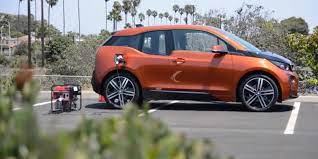Can a generator charge an electric car? This question has become increasingly relevant as electric vehicles (EVs) gain popularity. As we transition towards a more sustainable future, exploring innovative ways to charge electric cars is crucial. In this article, we will delve into the possibilities and benefits of using a generator to charge an electric car.
Can A Generator Charge An Electric Car: Exploring the Feasibility
Charging an electric car typically involves plugging it into a power source, such as a charging station or a home outlet. However, some unique situations may call for alternative charging methods, and using a generator is one of them. Let’s examine the feasibility of this approach.
- Understanding the Basics To answer the question, “Can a generator charge an electric car?” we need to understand how both generators and electric cars work.
- Generators: Generators convert mechanical energy into electrical energy. They consist of an engine, which can run on various fuels, and an alternator that generates electricity.
- Electric Cars: Electric cars are powered by rechargeable batteries. They have an onboard charger that converts AC power into DC power to charge the batteries.
- Connecting a Generator to an Electric Car In theory, it is possible to connect a generator to an electric car using a power inverter. The generator’s electrical output is converted from AC to DC by the inverter, which can then be used to charge the car’s batteries. However, several factors need to be considered.
- Generator Capacity: The generator’s capacity should match or exceed the car’s charging requirements. Electric cars come with different battery sizes and charging capabilities.
- Charging Time: Generators may not charge an electric car as quickly as traditional charging stations. The charging time will depend on the generator’s power output.
- Fuel Type: Generators can run on gasoline, diesel, propane, or other fuels. The choice of fuel can impact both the cost and environmental considerations.
- Emissions: Using a generator to charge an electric car may produce emissions, depending on the type of fuel used. This may not align with the eco-friendly goals of many EV owners.
- Benefits of Using a Generator to Charge an Electric Car While using a generator to charge an electric car may have its limitations, there are scenarios where it can be beneficial.
- Emergency Charging: In case of power outages or when traditional charging options are not available, a generator can serve as a backup source for recharging an electric car.
- Remote Locations: If you are in a remote area without access to charging stations, a generator can provide a means to charge your electric vehicle.
- Off-Grid Living: Individuals living off the grid who already own a generator for other purposes may find it convenient to use the same generator for their electric car.
- Mobile Charging: Portable generators can be used for on-the-go charging, making it a useful solution for road trips and outdoor adventures.
- Considerations and Challenges Despite the potential benefits, using a generator to charge an electric car comes with some challenges and considerations.
- Fuel Costs: Running a generator can be expensive, especially if it relies on gasoline or diesel. The cost of fuel should be factored into the overall cost of charging your electric car.
- Environmental Impact: Generators emit carbon emissions, which is counterproductive to the eco-friendly aspect of electric cars. However, this impact can be minimized by using cleaner fuel options.
- Noise and Vibration: Generators can be noisy and produce vibrations. This can be an inconvenience when compared to the silent and smooth charging process at traditional charging stations.
- Maintenance: Generators require regular maintenance, including oil changes and filter replacements. Neglecting maintenance can lead to breakdowns and interrupted charging.
Can A Generator Charge An Electric Car: Final Thoughts
In conclusion, while it is technically possible to use a generator to charge an electric car, there are several practical considerations and challenges to overcome. It may be a viable option for emergency situations, off-grid living, or remote locations, but it is not the most efficient or environmentally friendly method of charging. Electric vehicle owners should weigh the benefits and drawbacks before deciding to use a generator for charging.
The future of electric car charging is likely to involve more sustainable and convenient solutions, such as fast-charging stations and advancements in battery technology. As the EV industry continues to evolve, we can expect more innovative and eco-friendly ways to power our electric vehicles.
In the meantime, if you find yourself asking, “Can a generator charge an electric car?” remember that it’s possible, but it may not be the ideal long-term solution.
